 I am pleased to live in Colorado, for it is a state where the beauty of its natural resources and its people is completely incongruous to the events that unfolded in France last week. To the families of the innocent victims we at Think-Biblically.com offer our condolences and our prayers. To the families of the now dead perpetrators of these evil acts, and to all Muslims around the world whether practicing or not, we would like to say:
I am pleased to live in Colorado, for it is a state where the beauty of its natural resources and its people is completely incongruous to the events that unfolded in France last week. To the families of the innocent victims we at Think-Biblically.com offer our condolences and our prayers. To the families of the now dead perpetrators of these evil acts, and to all Muslims around the world whether practicing or not, we would like to say:
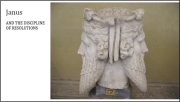 January first, the day millions – perhaps billions – of people make life-changing resolutions. New Year’s Resolutions is tradition that goes back thousands of years, all the way to the Babylonian Empire. The Babylonians vowed to repay their debts, but it is from the Roman’s that we inherit the modern practice. The Romans made promises to Janus, a god from whom many wrongly believe the month of January is named after (January is actually named after the god Juno). According to the Romans, Janus is the god of beginnings and transitions and has two faces, one on each side of his head, which permits him to look forward into the future and back into the past.
January first, the day millions – perhaps billions – of people make life-changing resolutions. New Year’s Resolutions is tradition that goes back thousands of years, all the way to the Babylonian Empire. The Babylonians vowed to repay their debts, but it is from the Roman’s that we inherit the modern practice. The Romans made promises to Janus, a god from whom many wrongly believe the month of January is named after (January is actually named after the god Juno). According to the Romans, Janus is the god of beginnings and transitions and has two faces, one on each side of his head, which permits him to look forward into the future and back into the past.
 It has been surprising to me how many Christ-followers do not know the timing of events related to the birth of their Savior. A mixture of tradition and good storytelling have confused many, so Think-Biblically.com is taking a moment to explain the timeline of events that may contain a surprise or two even for the seasoned believer.
It has been surprising to me how many Christ-followers do not know the timing of events related to the birth of their Savior. A mixture of tradition and good storytelling have confused many, so Think-Biblically.com is taking a moment to explain the timeline of events that may contain a surprise or two even for the seasoned believer.
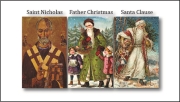 Ever wonder where the legend of Santa Claus came from? Or the tradition of giving gifts at Christmas time? How did the celebration of Jesus’ birth turn into the largest commercial gift-giving franchise of all history? Well gather around, sit back in a comfortable chair near the fireplace, and prepare to be entertained by a bit of history.
Ever wonder where the legend of Santa Claus came from? Or the tradition of giving gifts at Christmas time? How did the celebration of Jesus’ birth turn into the largest commercial gift-giving franchise of all history? Well gather around, sit back in a comfortable chair near the fireplace, and prepare to be entertained by a bit of history.
 A good friend of mine is in the midst of tough times and the experience has caused questions he has set aside in the pest to come to the center of his attention. Questions like, “why is there so much suffering in the world?” and “why doesn’t God do something about all the suffering in the world?”. There are of course quick answers to these questions: (1) we brought suffering into the world when we sinned and (2) God is not responsible for making our lives easy. While these answers are true, they do not satisfy the deep feelings evoked when going through intense suffering. I do not believe he is alone in his questioning, and for this reason Think-Biblically.com will launch a new Bible study series on the book of 1 Peter.
A good friend of mine is in the midst of tough times and the experience has caused questions he has set aside in the pest to come to the center of his attention. Questions like, “why is there so much suffering in the world?” and “why doesn’t God do something about all the suffering in the world?”. There are of course quick answers to these questions: (1) we brought suffering into the world when we sinned and (2) God is not responsible for making our lives easy. While these answers are true, they do not satisfy the deep feelings evoked when going through intense suffering. I do not believe he is alone in his questioning, and for this reason Think-Biblically.com will launch a new Bible study series on the book of 1 Peter.
 Thank you readers of Think-Biblically.com for your feedback and valuable questions regarding our Christmas timeline. At your request we’ve put together a chart that shows much of what was discussed on Christmas Eve day and the Scripture passages that match the events. This probably should have been part of the article in the first place.
Thank you readers of Think-Biblically.com for your feedback and valuable questions regarding our Christmas timeline. At your request we’ve put together a chart that shows much of what was discussed on Christmas Eve day and the Scripture passages that match the events. This probably should have been part of the article in the first place.
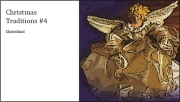 In the first of the Christmas Tradition articles, “Christmas Trees”, we discovered one possible origin of the tradition is Martin Luther. When walking home one Christmas Eve Martin Luther was suddenly struck by the beauty of a grouping of evergreens lightly dusted in snow. In the moonlight they shimmered and glowed with what he believed to be the holiness of the season. Once home Martin chopped down a small fir tree and took it inside to share the experience with his children. As they were celebrating the birth of the light of the world, they decorated the tree with candles. Probably sometime after his inspiration for the Christmas tree Martin Luther, vexed by the attention St. Nicholas was given by the Catholics, invented a story to restore the focus of the season on the Savior. He created Christkind.
In the first of the Christmas Tradition articles, “Christmas Trees”, we discovered one possible origin of the tradition is Martin Luther. When walking home one Christmas Eve Martin Luther was suddenly struck by the beauty of a grouping of evergreens lightly dusted in snow. In the moonlight they shimmered and glowed with what he believed to be the holiness of the season. Once home Martin chopped down a small fir tree and took it inside to share the experience with his children. As they were celebrating the birth of the light of the world, they decorated the tree with candles. Probably sometime after his inspiration for the Christmas tree Martin Luther, vexed by the attention St. Nicholas was given by the Catholics, invented a story to restore the focus of the season on the Savior. He created Christkind.
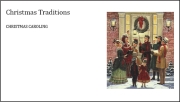 As mentioned yesterday, there appears to be a significant lack of Christmas spirit this season. One of the most time-honored ways of producing that spirit is the Christmas carol, especially when it is combined with the practice of “caroling”.
As mentioned yesterday, there appears to be a significant lack of Christmas spirit this season. One of the most time-honored ways of producing that spirit is the Christmas carol, especially when it is combined with the practice of “caroling”.
 After seeing the latest Hollywood exploit of a major Biblical story, I intended to write a review of Exodus: Gods and Kings. I considered talking about the stellar performances from the all-star cast, and the production value. All of which are exceptional. Then I thought of creating a list of all the ways the writers and directors altered the original story, which would have been remarkably long. In thinking it through I realized this isn’t the Biblical story, this is a new Moses, one where acts of nature replace acts of God, and acts of terrorism are accepted as acts of justice. A story where God is a figment of one man’s imagination after hitting his head on a rock. How can a movie be so good in so many ways and yet miss the mark so widely? Pondering this led me to a more important question, what creative liberties can one take with God’s Word?
After seeing the latest Hollywood exploit of a major Biblical story, I intended to write a review of Exodus: Gods and Kings. I considered talking about the stellar performances from the all-star cast, and the production value. All of which are exceptional. Then I thought of creating a list of all the ways the writers and directors altered the original story, which would have been remarkably long. In thinking it through I realized this isn’t the Biblical story, this is a new Moses, one where acts of nature replace acts of God, and acts of terrorism are accepted as acts of justice. A story where God is a figment of one man’s imagination after hitting his head on a rock. How can a movie be so good in so many ways and yet miss the mark so widely? Pondering this led me to a more important question, what creative liberties can one take with God’s Word?

Last year we started a tradition of giving our readers a speacila gift on Christmas day, and this year we bring you another free download. Download our latest periodical on one of our most liked series of the last year, Five Forms of Prayer. Feel free to to download it, print it and share it with those you believe may benefit most.
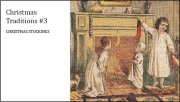 If you have not read yesterday’s article From Saint Nicholas to Santa Claus, please go back and read it first. This will make much more sense with the foundation that article supplies. If you have read yesterday’s article, then you already know of Saint Nicholas’ connection to Christmas and why he is associated with the act of giving gifts. What you may not know is how this man of faith may have begun the tradition of hanging a stocking “by the chimney with care.”
If you have not read yesterday’s article From Saint Nicholas to Santa Claus, please go back and read it first. This will make much more sense with the foundation that article supplies. If you have read yesterday’s article, then you already know of Saint Nicholas’ connection to Christmas and why he is associated with the act of giving gifts. What you may not know is how this man of faith may have begun the tradition of hanging a stocking “by the chimney with care.”
 I’m taking a quick time-out on our normal holiday schedule to address a concern that this country is not getting with the Christmas Spirit. Yes, I’m looking at you Ferguson, New York, Los Angeles and Denver. For all the rioting concerning Michael Brown and Eric Garner there is one point that bears understanding: Neither of these two individuals would be dead today if they hadn’t broken the law. It doesn’t matter what color any of the participants in these dramas are, plain and simple, these two men made some seriously bad decisions and it got them killed.
I’m taking a quick time-out on our normal holiday schedule to address a concern that this country is not getting with the Christmas Spirit. Yes, I’m looking at you Ferguson, New York, Los Angeles and Denver. For all the rioting concerning Michael Brown and Eric Garner there is one point that bears understanding: Neither of these two individuals would be dead today if they hadn’t broken the law. It doesn’t matter what color any of the participants in these dramas are, plain and simple, these two men made some seriously bad decisions and it got them killed.
